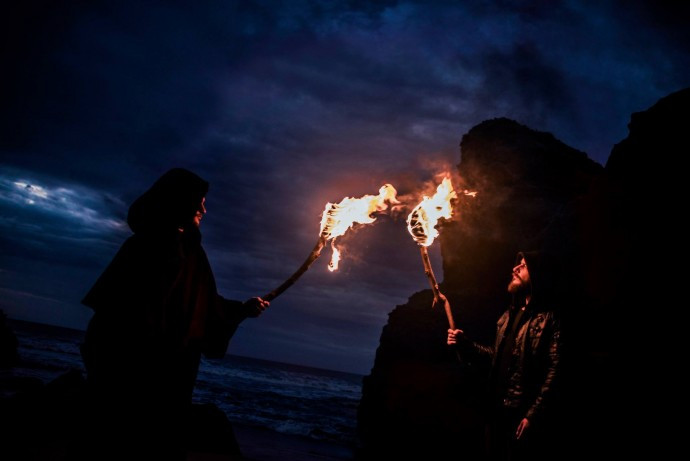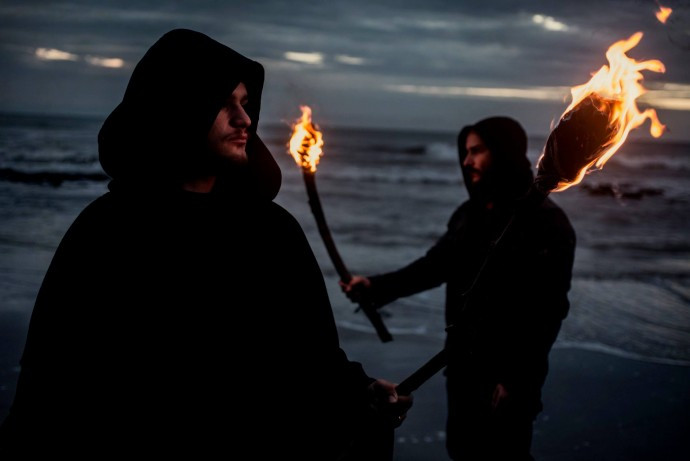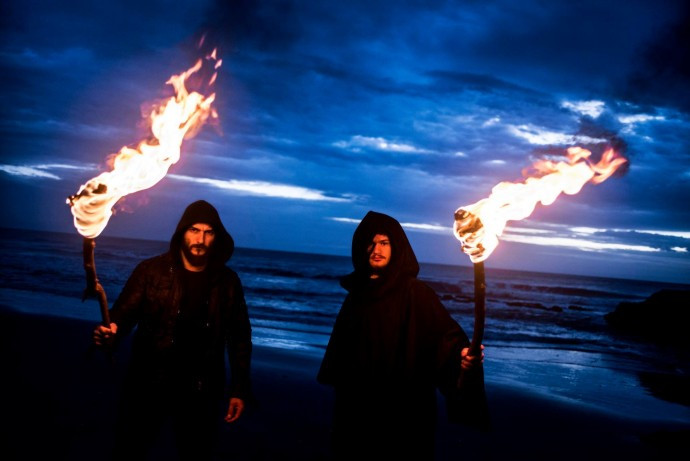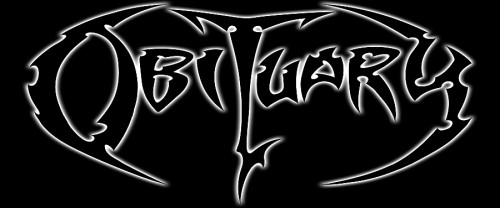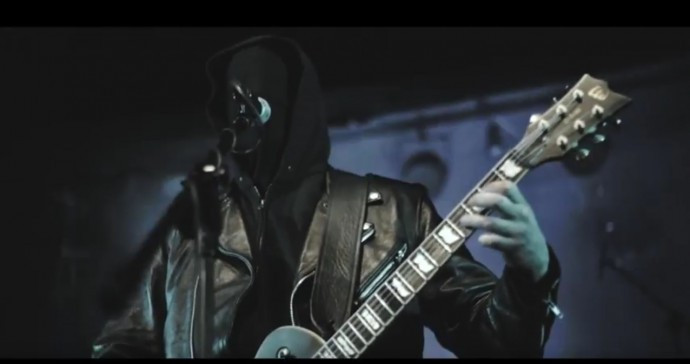For a mild-mannered band that was conceived 45 minutes outside New York City and moved to Brooklyn to work in music, Yellow Eyes' back story is pretty fucking intense. It also makes perfect sense that living in the Czech Republic, amidst an often volatile environment, deeply affected their relationship with black metal. That intensity and tension manifest in Yellow Eyes' music not in a political or ideological sense, but through the maelstroms of icy brilliance that they whip up. Their third, and most recent, full-length album, Sick With Bloom, was an unmitigated success, hailed by both critics and fans as the band’s most focused and furious offering to date; it came out at the tail end of 2015 via Gilead Media, and landed like a neutron bomb right in the middle of more than a few carefully calibrated year-end lists, missing ours only by dint of that cheeky late release date (though I squeaked it onto my own, and got real excited about it regardless).
I’ve taken a lot of interviewees to the Whiskey—from honky tonk queens to Chinese throat singers—but Yellow Eyes is the first black metal band I’ve beckoned down into the cool, dark basement bar across the street from VICE’s now-former office in Williamsburg, an astronomically hip neighborhood in Brooklyn. It’s no Helvete, but it’s a nice place to talk about life and music over a beer and chicken nuggets. I’ve known the two Skarstad brothers who started the band since shortly before they released their second record, 2013’s Hammer of Night, and since then, have been watching the momentum steadily build for them and their shifting cast of bandmates (the band is currently rounded out by longtime bassist Alex DeMaria and drummer Mike Rekevics, who’s also smeared his ashen fingertips all over Fell Voices, Vilkacis, Vanum, Vorde, and Ash Borer).
In between sips of bourbon and pauses to wipe the barbeque sauce off our faces, we start talking about how Yellow Eyes began—how Will taught himself first to play guitar by re-recording Opeth and In Flames albums on a four-track in his bedroom, inadvertently developing the distinct, sinuous style of playing that’s served him so well.
“The only way I knew how to play the guitar—because none of my friends liked metal—was just to re-record most of the parts. I thought, apparently that's just how you play metal. You have two guitar parts that weave in and out,” he remembers. In 2011 or so—neither can remember exactly when—the brothers shanghaied their then-roommate into learning how to play blastbeats, then recorded their first album, Silence Threads the Evening’s Cloth, in three hours, using tiny combo amps and zero expectations. They put a Mediafire link up on Myspace, and waited to see what happened, and from there, the album hit Limewire, wending its way through the labyrinthine bowels of the internet, until it landed in the nebulous clutches of the Russian torrent sites.
Three years later, the same thing happened—only this time, instead of Myspace, Yellow Eyes’ new album was already streaming on a major publication’s website, and highly-respected label Gilead Media had already been busily packing up pre-orders for weeks. Sam admits to feeling a “flash of anger” upon discovering the leak, while Will was preoccupied with a more curious detail.
“I like Russian download sites because my girlfriend is Russian, and I’m in Russia a lot, but I still don't understand what’s going through their minds. Someone commented, ‘This is not bad for a couple of basketball vegans,'” Will tells me, his brow furrowed quizzically. I didn’t have any insights to offer besides thinking it might be a bizarre way of calling them “hipster,” but can assure you that these guys are definitely not vegan, and there’s nothing hip about them.
As an American black metal band—albeit one whose take on the genre sounds much more European than Cascadian—I’m sure that’s not the worst criticism that’s been electronically hurled at Yellow Eyes, either. Their close association with bands like Ash Borer, Anicon, and Fell Voices may peg them as part of an evolving USBM (United States Black Metal) scene, but Yellow Eyes really operates as a self-contained unit, a Wardian case that admits outsiders only after the most careful consideration.
“We wanted to do this after living abroad, and building connections to other places. I never thought of us as USBM, until somebody said it about us, then, ‘Oh, yeah, I guess we're from the US and we're playing black metal, okay,'” Will concedes. The bulk of their connection to metal and inspiration for the band comes directly from those experiences overseas, so, as is always the case when discussing the ins and outs of black metal, our conversation led us to Norway.
“I was 18 and heavily into metal, and everybody I knew was going to college. Luckily, we have artistic parents, I guess you'd say, so when I was like, ‘I wanna go somewhere,’ they were like,’You can go anywhere.’ So I thought, ‘Anywhere? I'll put this to the test, find the furthest place I can go, and see if it actually works,’" Will explains. "I took a year off, and I lived in a tent on the beach in Madagascar for three months. And then I flew to Norway, because I knew that black metal was coming from Norway, and our family’s Norwegian, so I felt a very strong connection.” He ended up working on a farm, and spent his free time (and all of his wages) at CD stores, buying up their black metal stock.
“It's almost lame, but I remember getting [Darkthrone’s] A Blaze in the Northern Sky on CD, and going for a long walk through the woods. At first it didn't click immediately. I remember I listened to it two, three, four times. And then, suddenly, it clicked. And I was like, ‘I will never listen to Swedish melodic death metal ever again.'”

The same principle explains how, when he and Sam were still in their early 20s, they ended up living in the Czech Republic, another experience which made a huge impact on their musical development. For Sam, who was only 21 or 22 at the time, it signaled a shift in his appreciation for metal, which had heretofore been solely his brother’s obsession. He became a casual metal listener by default, since he and Will grew up sharing a bedroom, and big brother Will always controlled the stereo. But Prague changed that.
“Thats where I fell in love with metal for the first time. I had always associated metal with dominance over me—like my older brother's dominance over me was symbolized by metal—so as the younger brother, I had a built-in distaste for it. But when we moved to this place and were completely vulnerable, it was a really intense time, personally, and suddenly going to these concerts and feeling vulnerable and feeling intense, it was the perfect music for me at that time,” Sam explained. “It was the first year of my life where I didn’t have anything to do, and it was this complete pivot point. I didn’t know where I was going, and I really understood what bleakness was for the first time: winter in Prague with no friends, no money, no job, just trying to survive.”
Will found a job teaching English, and once Sam had blown through his meager savings, he found himself working the overnight shift at a “weird little cash-only hostel where people were always trying to break in.” There, he met a host of colorful characters, including a short, stocky man with whom he ended up spending many of his 12-hour shifts. They got along well enough, but there was one glaring issue.
“Yeah, my coworker was a Nazi,” Sam comments ruefully, recalling the man’s massive “Skinhead” chest tattoo and aborted plan to cause mayhem during President Obama’s visit in 2009. That wasn’t the first time the brothers encountered political extremism during their time in Prague; as Will recalled earlier, it jumped up and smacked them in the face as soon as they got to town.
Yellow Eyes itself is an entirely apolitical entity; the lyrics eschew hackneyed battle tropes or Satanic shlock in favor of focusing on strange, abstract, almost poetic themes, heavily inspired by nature, solitude, and decay. This is nothing new in black metal, of course, but the elegance and conviction with which they execute these morbid lines is impressive. As with much of extreme metal, the riffs are the main event here. Sam and Will’s playing comes across like a singular entity, their guitars perfectly fluid and eerily in sync as they hammer out straightforward but still forward-thinking black metal that tempers beautifully clean, melodic leads with distorted tremolo.
The devil’s always in the details with this kind of music, and on Sick With Bloom, Yellow Eyes conjures up an unsettling vibe via atmospheric moments, aided by the use of haunting field recordings captured outside Will and Sam’s isolated family cabin. It’s devoid of both Finnish filth and Cascadian whimsy; instead, Sick With Bloom is its own master, beholden to none but those who have created it. That's why I myself have referred to the album as “the future of American black metal,” and I’ll stand by that even more firmly now that it’s had some time to foment.

It’s no small wonder that Sick With Bloom stirred up a considerable amount of interest in the press, or that the band’s star continues to rise. Hitting the road with Anicon last year for Yellow Eyes’ first-ever tour was a big step forward for a band that had, until a couple years ago, never bothered to play live more than a few times a year. Earning a cosign from a tastemaking label like Gilead Media was even bigger. One of the most endearing things about the Yellow Eyes brothers is how genuinely excited they are about everything that’s happening to them; they seem truly surprised when they encounter a fan, and are boundlessly appreciative when they meet one.
“If I run into somebody 'round here who says, ‘I love your band and I bought a record from you,’ andthey tell me their name, I can usually remember where they live because I sent them a record,” Will says. “Like with Hammer of Night, when I was putting together these handmade, branded wooden boxes to send with each tape, each one of those took me so long to make, and on purpose we sold them for, like, $20. I had to take a lot of time off work or after work to do it, but it didn't matter, because you just want to deliver the vision. I don't have to be making $20 an hour [with this band], I've probably made $2 an hour or something like that, but it's still totally worth it.”
That DIY approach comes as second nature, perhaps because the brothers grew up surrounded by music—their mother is a composer—and currently make their own livings in the same field, with Sam working as a commercial composer and Will as a violin restorer. They still record all of their own music themselves, and their views on recording harken back to those two barely-grown men who slapped together a recording in their bedroom around five years ago and somehow struck gold.
“I guess some people could say the price of admission is high, you need to buy your equipment and stuff,” Sam allows. “But if you buy a tape machine and a Fender Squire, there you have the tools to make the coolest black metal record anyone's ever heard in their life. And that can be like $50 in total. There's no financial barrier to making cool, extreme music at all.”
Taking their own advice has surely helped Yellow Eyes carve out a rapidly expanding place for themselves amidst today’s glutted extreme metal scene, and things just keep getting better for them and their bandmates. They recently started working on dates for a European tour, including an appearance at Germany’s Kings of Black Metal festival in April, and have gotten offers from multiple other countries (their dream is to return to Eastern Europe for a tour, but we’ll have to see what shakes out).

The band was also just announced as part of the inaugural Migration Fest, a multi-day festival set in Olympia, Washington and curated by Gilead Media and 20 Buck Spin. The lineup is stacked with underground metal’s best (and most buzzworthy) names, and Yellow Eyes is slotted in neatly next to Thou, The Body, VHOL, Krallice, Vastum, Mutilation Rites, Full of Hell, Christian Mistress, Krieg, and a host of other bands who regularly top year-end lists and sell the shit out of limited edition vinyl pressings. To put it in perspective: Migration is Coachella for people who make their own Weakling patches and still care about cassette tapes. It’s excellent company in which to find oneself, and signals yet another sea change in Yellow Eyes’ fortunes. After years of travel, trials, and just plain trying, they’ve finally been invited to the big kids’ table.
When they get up on that stage, though, nothing will change (except the possibility that they may get to borrow some nicer gear). The goal remains the same—they don’t have one. As Sam says, “We're not trying to have this big show-ready sound. It's about trying to communicate something, some intangible thing. We're just putting out this little beacon, and whoever's drawn to it will follow. We're not trying to demolish a crowd. It's not that kind of thing.”
Will sums up their approach in typical self-deprecating but honest fashion: “Sam got his amp for free. My amp is horrible. We don't know anything about gear. I don't use any pedals. We just have these songs.”
